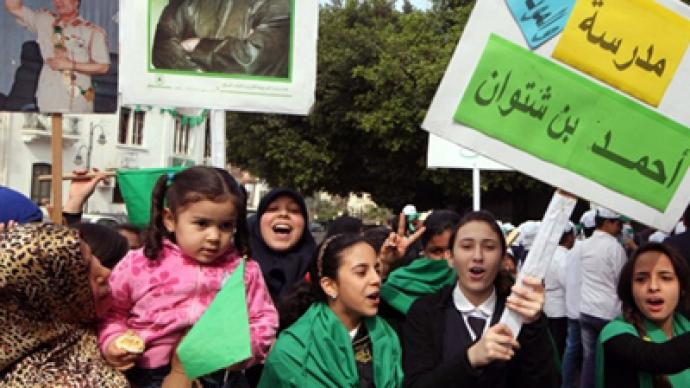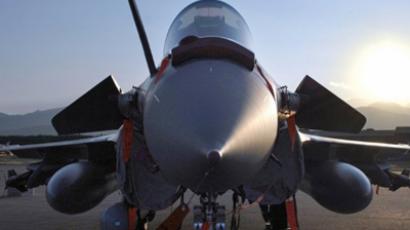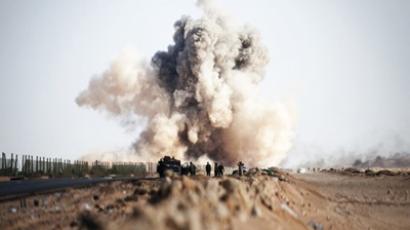No unity in coalition as pro-Gaddafi forces shell rebel-held towns undisrupted

Fresh explosions and gunfire have been heard in Tripoli, with reports of coalition forces, targeting major military facilities across Libya. Still, the US-lead alliance has yet to agree on who should be in charge of the ongoing operation.
A loud explosion was heard in the Libyan capital Tripoli early Thursday morning. Smoke was seen coming from where a military base is situated, Reuters news agency reports. This follows a series of explosions which hit the Libyan capital late on Wednesday.Libyan officials have accused the coalition forces of killing scores of civilians, claims that the US military denies. The Libyan authorities invited journalists to a hospital in Tripoli to show them 18 bodies of military personnel and civilians, allegedly killed in the coalition attacks overnight. The US and the allies have recently stepped up their campaign, destroying Libyan tanks and artillery. The USA announced that a no-fly zone has been successfully established over the territory of coastal Libya. However, the efforts of the allied forces have so far proved unable to stop Muammar Gaddafi forces from shelling rebel-held towns. Pro-Gaddafi forces have pressed ahead with assaults on the towns of Misurata, Ajdabiya and Zintan, Al Jazeera reports. In Misurata snipers have reportedly killed 16 people. There are reports that opposition forces in the town are running low on food and medicine.At the same time, within the coalition disagreement has risen over who will lead the Libyan campaign. US president Barack Obama announced that in light of other US-led wars, America is due to shed its leadership in the operation.While some of the member states argue that the no-fly zone operation should be run by NATO, France wants the alliance to play more of a technical, secondary role. The country suggests that political control over the mission should be conducted by a group of coalition members, including the Arab League.French Foreign Minister Alain Juppe said on Wednesday that the topic will be discussed at the international conference in London next Tuesday, which will also be attended by members of the Arab League and African Union. Juppe said that the conference is set to decide on the structure of the mission’s command. He also stressed that the mission itself was under the UN mandate.While many point in the direction of the US saying that other members of the alliance simply followed it into the campaign, British MP John Baron insists that the initiative orginally came from London and Paris.“Britain wasn’t following the US. Quite the reverse. I think Britain and France were actually leading the arguments and were instrumental in getting the UN resolution through,” he told RT. “So, I don’t think we can be accused of following in this case.”“But even though we’ve led, I personally disagree with the actual intervention itself. I think it once again shows we are meddling in another Muslim country. Our record of intervention hasn’t been good in the past,” Baron added.
F. William Engdahl, the author of a book on Totalitarian Democracy in the New World Order, explains the factors behind the conflicting voices and inconsistencies coming from top Western officials amid the continuing mission in Libya. He believes that the term “coalition” should be changed to “coalition of the unwilling”.“There’s no clear mission here. The Europeans, the Russians, the Chinese and, I think, some members of the Arab League now realize that they’ve been essentially tricked by apparent confusion in Washington and the manipulation by Washington, Obama, [Amr] Mousa and the Arab League to get this ‘yes’ vote that tipped the UN Security Council,” he told RT. “And that gave Washington the entry into this no-fly zone, which is a war declaration. There’s no peaceful no-fly zone in history.”Engdahl particularly stressed that Amr Moussa, the Secretary-General of the Arab League, knew this beforehand and yet supported Washington’s campaign.“He has ambitions to become president of Egypt, and US backing is a big feather in his cap – he knows that,” the author said.“But this is ultimately a part of the larger agenda that Washington has behind the transition of the Greater Middle East, literally from Morocco to Afghanistan… to create a huge zone of influence, where the United States would directly control capital flows, oil flows and, essentially, chalk points of oil to places like China and the European Union,” F. William Engdahl concluded.
Meanwhile, Rick Rozoff, a Chicago-based anti-war activist who heads “Stop NATO,” says the actions of the US and its allies in Libya are just the precursor to a new political order in the Mediterranean region, where greater NATO presence will mean increased American control.Rozoff told RT that the next phase of the US-led operation in Libya will probably be ground support of rebel forces there. “In the 1990s as a part of what would become the global expansion of NATO, several partnership programs, as they called them, were set up – one of which is called the Mediterranean Dialogue. It includes seven nations in the Middle East and North Africa. Two of them do not border the Mediterranean (Jordan and Mauritania), but the other five do,” he said. “Libya is the only North African country bordering the Mediterranean that is not a member of this NATO partnership program. I am convinced that in both Washington and Brussels, whatever regime they want to enforce to replace Muammar Gaddafi, [it] would in fact join that program and would solidify NATO and US control of the entire Mediterranean Basin.” “Whoever the armed insurgents are – and I don't think anyone truly knows the true nature of the insurgents – they are not able to fight, clearly. This is why there is bombing not only of airfields and radar facilities and so forth in Libya, but also bombing of troop and armored convoys. So, the West has already intervened on behalf of an armed insurgent group, and the next step of course is to become more involved in the ground campaign," Rozoff concluded.
Ivan Eland, Senior Fellow at the Independent Institute in Washington DC believes that the US forces have hurried the beginning of the military operation, giving no thought to what would happen if this first round did not work.“There is a possibility that this could escalate at some point – a Saddam Hussein type episode, where years later you have to take him out because he is still there,” he said. “When we demonize leaders, as the United States has demonized Gaddafi and Saddam Hussein, then of course it becomes difficult to reach some sort of a settlement with them, and then eventually it comes to taking them out. And they really don’t need to be taken out of course, because the United States overdoes it in these things,” he stated. “I think the US is faced with a problem and its coalition partners are faced with a problem, that there is probably going to be a military stalemate.”














